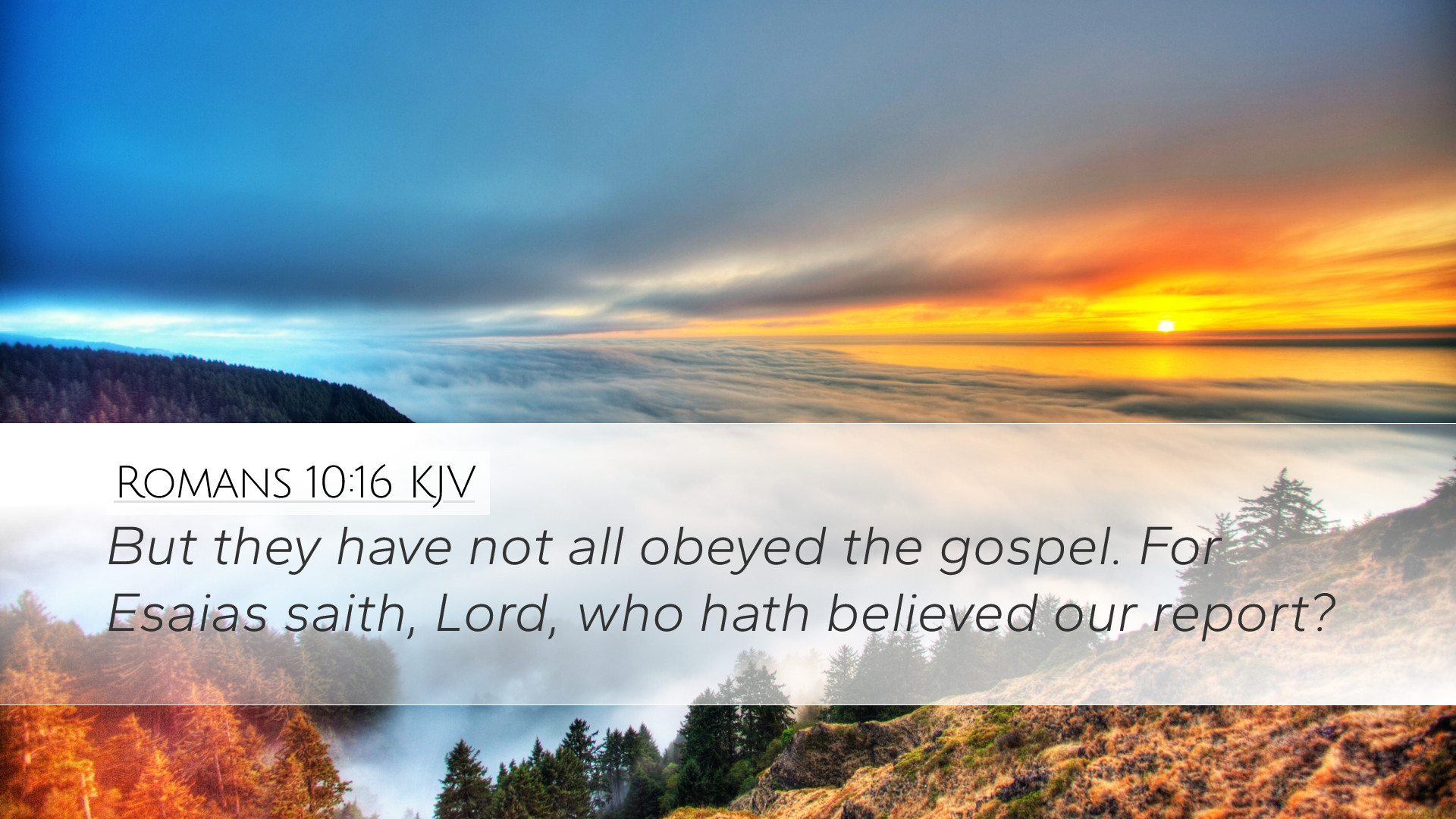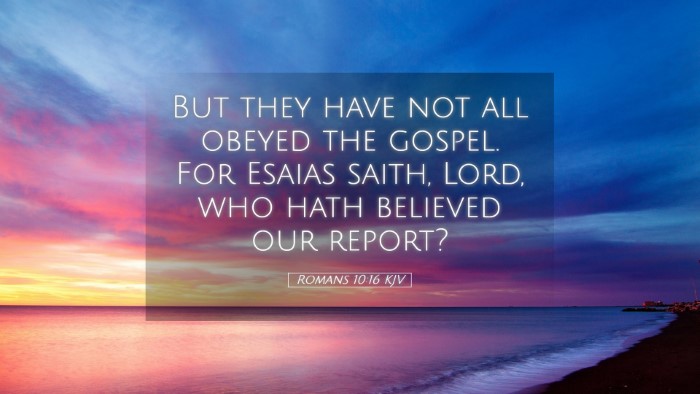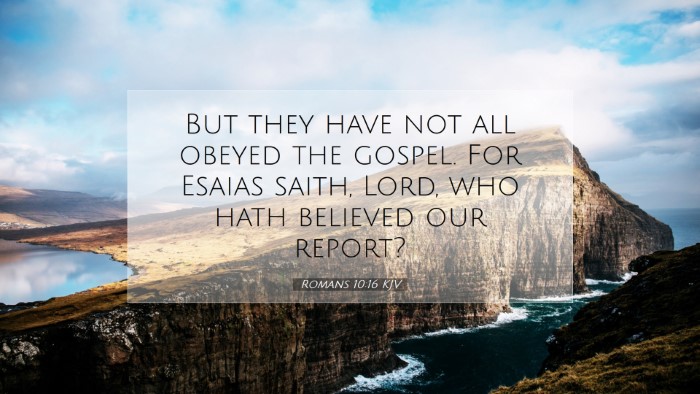Old Testament
Genesis Exodus Leviticus Numbers Deuteronomy Joshua Judges Ruth 1 Samuel 2 Samuel 1 Kings 2 Kings 1 Chronicles 2 Chronicles Ezra Nehemiah Esther Job Psalms Proverbs Ecclesiastes Song of Solomon Isaiah Jeremiah Lamentations Ezekiel Daniel Hosea Joel Amos Obadiah Jonah Micah Nahum Habakkuk Zephaniah Haggai Zechariah MalachiRomans 10:16
Romans 10:16 KJV
But they have not all obeyed the gospel. For Esaias saith, Lord, who hath believed our report?
Romans 10:16 Bible Commentary
Commentary on Romans 10:16
Romans 10:16 (KJV): "But they have not all obeyed the gospel. For Esaias saith, Lord, who hath believed our report?"
Introduction
The Apostle Paul, in this epistle, addresses the relationship between Israel and the gospel, emphasizing the need for faith in Christ. Romans 10:16 serves as a poignant acknowledgment of the fact that not all have accepted the message of salvation. This commentary synthesizes insights from esteemed biblical scholars, including Matthew Henry, Albert Barnes, and Adam Clarke, to provide a comprehensive understanding of this verse.
Understanding the Verse
This verse underscores a central theme in Paul's writings: the necessity of belief in the gospel. The use of the phrase "not all obeyed the gospel" highlights the disobedience of many, which is a recurring theme in Israel's relationship with God throughout the Old Testament.
Contextual Analysis
To fully understand Romans 10:16, it's essential to look at it within the broader context of Romans 10. Paul discusses God's desire for all people to be saved and the means by which salvation is offered—through faith in Jesus Christ. Matthew Henry remarks that this disobedience points to a larger narrative of Israel's rejection of God’s message, reflecting the hardness of heart that is often found within. Paul cites Isaiah (Esaias) to highlight this unbelief as an ongoing issue among the people, reinforcing the prophetic implications of their actions.
Theological Implications
The statement "For Esaias saith, Lord, who hath believed our report?" invites critical reflection on faith and its reception. Adam Clarke elaborates on the gravity of this question, illuminating the struggle of conveying divine truth to a reluctant audience. The use of the term "report" signifies the announcement or proclamation of God's salvation—essentially, the gospel itself. Therefore, the verse prompts believers to examine the ways in which the message of Christ is received and responded to in their own contexts.
Matthew Henry's Insights
- Matthew Henry contextualizes the disobedience mentioned in this verse, emphasizing the historical backdrop of Israel's unfaithfulness. He asserts that the rejection of Jesus as the Messiah exemplified a broader pattern of Israel’s failure to heed God’s messages throughout history.
- He highlights how the gospel is not merely a universal proclamation but requires an active obedience—one that includes belief and acceptance of its truths. This reflects Henry's insistence on the transformative power of truly receiving the gospel.
Albert Barnes' Contributions
- Albert Barnes notes that the quotations from Isaiah serve to illustrate the persistent issue of unbelief. He comments on the harsh reality that many heard the gospel yet chose not to accept it.
- Barnes emphasizes the role of faith, pointing out that salvation is not just about hearing the message but also about believing it. He argues that the lack of faith among the people becomes a central barrier to their redemption.
Adam Clarke's Observations
- Adam Clarke provides a detailed view on the spiritual condition of those warned by the prophets but who failed to respond. He describes the emotive weight of Isaiah’s lament, capturing the deep sorrow over Israel’s unbelief.
- Clarke articulates the duality of the gospel message—as both a call and a challenge. He asserts that every generation must grapple with the question: Will they heed the call of the gospel, or will they follow in the footsteps of the disobedient?
Application for Believers
Romans 10:16 serves as a sobering reminder for contemporary believers. Pastors, theologians, and students must recognize the significance of obeying and believing in the gospel. The disobedience of the Jewish people serves as a cautionary tale for the church today. Just as they had access to the truth yet chose to reject it, believers today must actively choose faith over apathy.
Conclusion
In conclusion, Romans 10:16 invites deep reflection on the nature of faith and obedience in the gospel message. The combined insights of Matthew Henry, Albert Barnes, and Adam Clarke challenge readers to examine their own responses to the gospel. As believers, the task is to ensure that the proclamation of the good news resonates in our hearts, resulting in active faith and obedience. The call of the gospel is a clarion call for all to believe, prompting each generation to respond with fidelity and earnestness.


